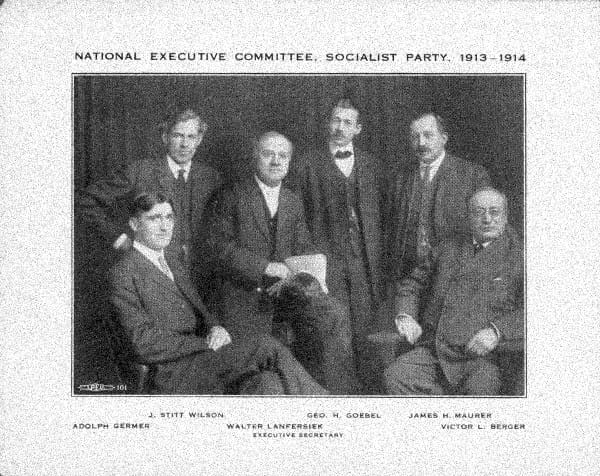It’s Our Fault
On MANGO’s, Coconuts, and the Responsibility of a Powerless Left.

Since the election, establishment Democrats have, not surprisingly, blamed the Left for Trump’s victory. Conveniently absolving themselves of any wrongdoing. The Left, of course, insists on their innocence by virtue of their powerlessness. After all, Joe Biden and Kamala Harris are the Establishment.
Both sides have a point. The Left is institutionally and politically weak. Yet, since 2016, some strikingly progressive ideas have found their way into the platforms of prominent politicians and the mainstream political conversation. Some have even been tested out in government policy. And, in fact, many of the ideas that helped to define the Democratic Party’s image between 2020 and 2024 were identifiably left-wing ideas.
Politically, the results have not been salutary. Trump made yet more gains among the working class, and especially in the Left’s own backyard—deep blue urban counties.
We can comfort ourselves by throwing the blame back at elites like Barack Obama or Hillary Clinton. And no doubt they deserve it. For decades, liberal leaders ignored labor, embraced NAFTA, and shrugged at the offshoring of millions of blue-collar jobs. But we also ought to look coldly at the Left as it exists today and ask: are we part of the problem? Are we the baddies?
The truth is that while the Left has ably and admirably advocated against economic inequality, we have also helped promote, or failed to adequately criticize, monstrously bad ideas—ideas that have helped utz working-class voters away from our candidates and causes. The tragedy is that just as the Left rediscovered the working class as a political agent and began foregrounding the economic interests of the majority, it also embraced the peculiar values of a subset of the professional class.
That contradiction has now given way: Trump’s election, as much as it was a revolt against inflation, was a revolt against these values and a revolt against the class that embodies them.
It’s our responsibility to recognize our part in what went wrong.
The tragedy is that just as the Left rediscovered the working class as a political agent and began foregrounding the economic interests of the majority, it also embraced the peculiar values of a subset of the professional class.
Who’s to Blame?
In 2020-21, more than a dozen liberal city councils tried to defund or dismantle their municipal police. At whose behest? Surely not Nancy Pelosi’s. The demos can’t be blamed either, as poll after poll showed that the masses were opposed to dissolving police agencies. The drive to defund was primarily palpable on the Left.
The initial results of these experiments were uniformly disastrous, contributing to already spiking murder and assault rates. Most municipalities quickly reversed course and even moved to advertise impressive bonuses for new police recruits to help fill staff shortages. The lingering effect of that maelstrom of bad policies, bad messaging, and bad politics was, in part, why so many big-city Democrat voters turned toward Trump. According to a New York Times analysis, “voters in core urban counties shifted the most toward Mr. Trump [emphasis mine].” And his biggest gains were actually among non-white voters—the very group in whose name “defund” demands were made.
Today, most on the Left have slinked away from the so-called “abolitionist” position, some insisting that it was always a fringe idea. Yet almost none have issued any kind of mea culpa.
Or consider the question of drugs. In the past decade, a number of states and municipalities have experimented with drug decriminalization initiatives. These liberalization efforts were spearheaded by progressive groups and promised to lessen addiction and lower the rate of incarceration. The most sweeping of these was Oregon’s Measure 110. Sounding like something out of an Ayn Randian fever dream, it decriminalized all drugs for personal use. The effort was sold to voters as a maverick way to reduce overdoses and destigmatize drug use so that addicts could freely seek treatment. The results were, according to the NIH, not exactly promising: “Oregon’s rate of fatal overdose increased by approximately 50% compared to the previous year.” Moreover, the rate of addiction, homelessness, and violent crime also increased. Measure 110 was reversed in 2024.
The liberalization of drug laws has long been a demand of the libertarian Right. Yet, today, in the minds of most Americans, it is the position of an overly permissive Left. And that is, in part, because almost none of the ideological outlets of the Left have offered any sustained criticism of what has been a disastrous, and popularly repudiated, policy agenda.
Perhaps most significantly, look at immigration. In 2016 Bernie Sanders responded to a question from the liberal journalist Ezra Klein disavowing the notion of open borders. Revisiting that back-and-forth is instructive:
Klein: ...if you take global poverty that seriously, it leads you to conclusions that in the US are considered out of political bounds. Things like sharply raising the level of immigration we permit, even up to a level of open borders. About sharply increasing…
Sanders: Open borders? No, that's a Koch brothers proposal.
Klein: Really?
Sanders: Of course. That's a right-wing proposal, which says essentially there is no United States.…
Klein: But it would make…
Sanders: Excuse me…
Klein: It would make a lot of the global poor richer, wouldn't it?
Sanders: It would make everybody in America poorer! You're doing away with the concept of a nation state.
At the time the liberal press went berserk. Writers on the Left—from liberals at Vox to the radicals at n+1—insisted that open borders was a fine idea. And by 2019 the popular socialist podcaster Dan Denvir wrote “The Case Against Border Security” in the New York Times. He argued for demilitarizing the border, downsizing the border patrol, and proscribing their duties because “voters want more open borders.” Upon taking office, Biden actually did some of this. His policies, which loosened restrictions and lowered the priority of apprehending certain criminals, predictably created a lot of chaos (and failed to deliver justice for immigrants). And while the Biden administration reversed course halfway through his term, the damage was largely done.
The end result was that every formerly Democratic border county moved dramatically toward Trump in the last election. Every single one. Take Imperial County CA, as an example. An 86% Latino county, very blue-collar, historically very liberal. In '08 it went to Obama by +26%. In '12 by +32%. In '16 it went to Clinton by a whopping +41% (!). And in 2020 to Biden by a comfortable +24%.
But in 2024 it went to Harris by only +1.7%. Meanwhile Trump flat out won 12 of 14 majority-Hispanic border counties in South Texas.
These results can’t be chalked up to the general frustrations caused by inflation. Nor can they reasonably be attributed to xenophobia in towns where most residents have Mexican last names. Instead, as Texas Democrats warned, the new policies were a “recipe for disaster.” As with policing and drugs, the policy push for liberalizing border rules came from the Left, and that policy was a failure. It created chaos and made a dozen or so traditionally blue counties burn red. Not good.
Some might respond that none of the above policies were actually implemented in the ways that progressives advocated. Municipalities failed to fund police alternatives, decriminalization was enacted without treatment options, etc. But this is an easy out. Responsible political agents should be honest enough to recognize that failures can be in theory as well as practice.
Still, there remains something of a puzzle. How is it that a powerless Left has had so much influence in setting the agenda on issues as wide ranging as these? Why is it that woke ideas, associated with the Left, were so easily able to steer political debate despite progressives retaining no real political strength in the halls of power?
Class Values are Class Interests
Shortly after the 2024 election, Massachusetts Representative Seth Moulton complained of the Left: “I have two little girls,” he told The New York Times “I don’t want them getting run over on a playing field by a male or formerly male athlete. But as a Democrat, I’m supposed to be afraid to say that.” Afraid of who? Moulton is not easily bullied. Yet he feels compelled to adopt a position he knows is a political liability, and one he personally disagrees with. Why? Who is this anonymous Left that can make Chuck Schumer don a Kente cloth and bend the knee for #BLM but can’t seem to renegotiate a single trade agreement or pass any meaningful labor law reforms? Are they in the room with us right now?
What if, it’s not really a “Left” at all, but instead a class.
One of Karl Marx’s great insights was that political values are little more than a mask for class interests. Understanding the social conditions of a given class, how its members make their way in the world, helps us make sense of that collection of ideas that make up their ideology. Whatever passes for the Left today has a distinct ideology informed by its unique class base. Broadly, that base is made up of college-educated professionals, but much more specifically those in the media, the academy, the arts, and the activist NGOs: the MANGOs, as Alex Hochuli usefully termed them.
MANGOs, by their very nature, have influence in the world of politics and ideas. In some ways it's their job to have public influence. They staff congressional offices, they determine what news is worthy to print, they invent and circulate policies. They have a lot of power. Yet, they are generally shielded from the public. Their livelihoods are often the result of patronage, not governed by the rules of the market nor by the demonstration of merit. Moreover, they are uniquely politically situated such that their positions are never up for democratic challenge. Despite the sprawling influence of this clerisy, they are made responsible only to their peers. Think of the NGO director whose nonprofit manages to produce no tangible results save the impressive six-figure salaries of its leadership; or the salaried “fellow” whose generous stipend is provided by some foundation and whose task is to write endless babble promoting its views.
More than this, MANGOs share a social condition which provides them with a whole host of “peculiarly formed sentiments, illusions, modes of thought, and views of life”, as Marx puts it. (They even have their own dialect: some thought Kamala Harris was “brat”; others were “Coconut-pilled.”) As professionals in fields dependent on digital technologies, the condition of MANGO worklife—the basis of their politics and social relations—is shaped, above all, by the internet. Their lives are formed and fortified in the liquid spaces of social media, places where one can endlessly remake their “avatars” depending on whim. They swim amongst infinite opportunities for digital consumption, where the appearance of pure abundance gives rise to fantastic notions of limitlessness. Social voluntarism is the main principle of their relations; older social forms like the family and involuntary identities, like sex and nationality, are always suspect. On the internet, novelty and immediacy are prized above all. As Simone Weil once observed, they are uprooted, and in response to their own listlessness, they unwittingly advocate the uprooting of everyone else.
To get by or to get ahead, members of the MANGO class need credentials earned at university, where they are schooled, most importantly, in the values of their class. To get hired, to win grants, and to climb the social ladder, they have to demonstrate their fluency in these values and virtues: diversity, marginality, and fluidity are key. The constant status competitions witnessed on social media—the routine denouncing of this character, and praise of that one—aren’t just recreational sports but professional contests. When neither market competition nor democratic contests determine your success in life, status and scandal are handy means for advancement. MANGOs, then, operate like a kind of massified gentry, complete with an elaborate system of manners.
The degree to which MANGO values are shared among their class, without any seeming coordination, is remarkable. The fact that some MANGOs call themselves socialists, others progressives, and others still liberals, abolitionists, or anti-racists is largely meaningless. Despite whatever differences they self-profess, they share a basic class outlook. The Democratic Socialists of America (DSA), well known for denouncing liberals, profess a set of concerns in their political platform that is virtually identical to that put forth by the Democratic National Committee (DNC). Vague gestures toward democracy, aggressive calls for police reform, liberal immigration policies, environmentalism, and appeals to gender, sexual, and racial “justice” all feature prominently. Despite both groups insisting that they have nothing in common, the differences between them are only a matter of degree. In fact, the proceedings for the recent DNC chair elections were so full of woke theatrics that one could easily have mistaken the event for a DSA convention.
This is all to say that these ideas are not solely the property of the “Left.” In fact, they are not the rational, well-deliberated ideas of a conscious political grouping at all. It’s not as if DSA successfully infiltrated the heights of the Democratic Party to force an ideological reckoning. Instead, these are the peculiar expressions of a class ideology, received passively by members of the class and regurgitated unthinkingly among the class. It is by virtue of that class’s unique position, its proximity to power and outsized influence, that MANGO ideas can quickly jump from tweets, to academic papers, to foundation-sponsored policy memos in a flash. What appears as the impressive machinations of a powerless Left is really the work of a well-connected caste.
As Simone Weil once observed, they are uprooted, and in response to their own listlessness, they unwittingly advocate the uprooting of everyone else.
Everything Must Change, Except Our Opinions
According to some, the problem is not so much that the Left has promoted, or failed to criticize bad ideas, but instead that certain woke ideas have overshadowed a leftwing economic agenda. The takeaway is that we don’t really need to question any of the contemporary values that inform leftwing ideas. We just need a messaging adjustment to win back trust. This is wrong.
Take the question of gender. Consistent with the MANGO class condition that informs it, progressives have adopted a position that prioritizes maximum fluidity. Many on the Left continue to downplay the reality of biological differences between sexes, and deny that sex differences ought to inform public policy. They have routinely advocated the dismantling of boundaries between the sexes. But even the slickest messaging can’t change the fact that most people don’t agree that males should play in female sports, or that males should be admitted to female prisons, or that children should be permitted to take powerful and experimental hormonal drugs. Worse, as more people become acquainted with these issues (unlike with gay marriage), they seem to have become less sympathetic to these positions.
Most people simply disagree with the Left. And here’s the gutpunch: What if most people are right? There are good reasons to disagree with the received wisdom of the Left on pretty big questions. Because much of the received wisdom of the Left is not popular wisdom—formed through deliberation and debate—but instead reflects the narrow preferences and prejudices of an elite.
And there is a real danger inherent in failing to recognize this and rethink some of these ideas: if we don’t, someone else will.
A new dynamic at work in our age of digital hyper-partisanship is that many fear that any criticism of “our side” will be either weaponized by the Right or ridiculed by the Left. So we stay quiet. We neglect to criticize bad ideas from co-partisans in the hopes that by ignoring them they will die. In the hopes that common sense will prevail. But because so many of these ideas are informed by the MANGO class conditions, and align perfectly with elite interests, without sustained criticism, some of the worst ideas of the Left spread like wildfire.
The MANGO class can afford to be socially irresponsible. They are, to some extent, shielded from any real consequences of their behavior. But the Left can’t afford to be so flippant with ideas. As Marx pointed out, we have a special responsibility to renew the “ruthless criticism of all that exists,” including criticism of ideas associated with the Left. It is up to us to generate the ideas that can inform a real opposition to the rising tide of Right populism, and that can’t happen if we spend the next four years defending the ideology of a class we don’t have any business defending.
There is no shortage of writers on the Left who insist that everything must change. That the Democratic Party must be torn down. That the Left must be rebuilt wholecloth. That solidarity and sociality itself must be reimagined. And they are right. But few of these same advocates could be bothered to consider that their own opinions might be wrong. Informed by the wrong social base, advancing the wrong interests, and, therefore, desperately in need of rethinking. What good is it to strike out as an independent party, to build new organizations of the Left, and to elect new leaders if the basic political commitments of this next generation remain informed by the values of the same Brahmin caste and rejected by the very group we need most to win?
If the values of the Left remain unchanged, so too will its fortunes.
■
Dustin Guastella is Director of Operations at Teamsters Local 623, and a board member at the Center for Working-Class Politics.



